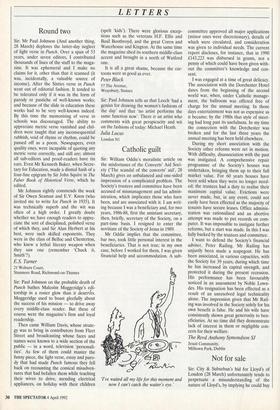LETTERS Round two
Sir: Mr Paul Johnson (And another thing, 28 March) deplores the latter-day neglect of light verse in Punch. Over a span of 53 years, under seven editors, I contributed thousands of lines of the stuff to the maga- zine. It was ephemeral and I make no claims for it, other than that it scanned (it was, incidentally, a valuable source of income). After the Sixties verse in Punch went out of editorial fashion. It tended to be tolerated only if it was in the form of parody or pastiche of well-known works; and because of the slide in education these works had to be very well-known indeed. By this time the memorising of verse in schools was discouraged. The ability to appreciate metric verse vanished and chil- dren were taught that any inconsequential rubbish, void of rhyme or rhythm, could be passed off as a poem. Newspapers, even quality ones, were incapable of quoting any metric verse correctly, and still are; almost all sub-editors and proof-readers have tin ears. Even Mr Kenneth Baker, when Secre- tary for Education, made a dismal hash of a four-line epigram by Sir John Squire in The Faber Book of Historical Verse, which he edited.
Mr Johnson rightly commends the work of Sir Owen Seaman and E.V. Knox (who invited me to write for Punch in 1935). It was technically superb and the wit was often of a high order. I greatly doubt whether we, have enough readers to appre- ciate the sort of disciplined, polished verse of which they, and Sir Alan Herbert at his best, were such skilled exponents. They were in the class of Belloc and Chesterton, who knew a lethal literary weapon when they saw one (remember 'Chuck it, Smith'?).
E.S. Turner
21 Woburn Court, Stanmore Road, Richmond-on-Thames


























































 Previous page
Previous page